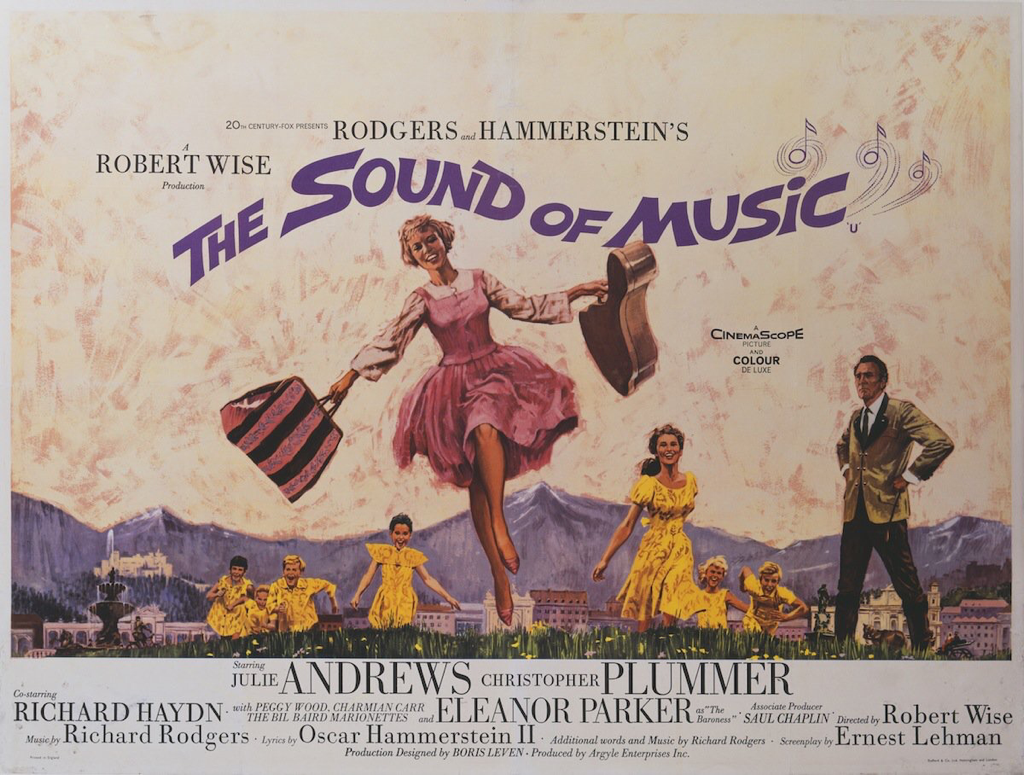Based on the 1959 Broadway musical by Howard Lindsay, Russell Crouse, Richard Rodgers, & Oscar Hammerstein II of the same name as well as Maria von Trapp’s 1949 memoir titled The Story of the Trapp Family Singers, The Sound of Music follows Maria Rainer (Julie Andrews), a good-natured but troublemaking postulant at a convent in the Austrian alps. Her main offenses are waltzing on the way to Mass, whistling on the stair, and singing in the abbey. Knowing how irresponsible she is, the Mother Abbess (Peggy Wood) puts Maria on probation and sends her to Salzburg to serve as the governess for the seven strapping von Trapp children. Their father, Georg (Christopher Plummer), a widower and former Navy captain, is a hardcore disciplinarian who orders his kids around with the aid of an impossibly shrill whistle. Maria, of course, takes a different tact, winning the children over with song, sewing play clothes out of old drapes, climbing trees, going on mountaintop picnics, and putting on puppet shows. Meanwhile, the captain's heart slowly opens when he sees the change in his children.
Since the memoir was published, Hollywood producers had expressed interest in making a film about the von Trapp family singers, but they were only interested in purchasing the title only. Maria refused as she wanted her entire story to be told. After a German-language version was released in 1956, Paramount Pictures bought the rights to make an English-language version with Audrey Hepburn as Maria. While the studio eventually dropped the idea, one of its directors, Vincent J. Donehue, suggested the story as a stage musical for Mary Martin. Therefore, producers Richard Halliday and Leland Hayward secured the rights and hired Pulitzer Prize-winning playwrights Howard Lindsay & Russell Crouse. Richard Rodgers & Oscar Hammerstein II were originally approached to write only one song for the musical, but offered to write a full new score instead after feeling that the two styles (traditional Austrian folk songs and their composition) would not work together. The Broadway musical under the title of The Sound of Music opened on November 16th, 1959, and became a huge hit. Its success led to 20th Century Fox buying the film rights in June 1960 for $1,025,000 against ten percent of the gross. In December 1962, Richard D. Zanuck, who was president of the company at the time, hired Ernest Lehman to write the screenplay. After having previously adapted Rodgers & Hammerstein’s The King & I as well as West Side Story for the big screen, Lehman reviewed Lindsay & Crouse’s original script for the stage musical, rearranged the sequence of songs, and began transforming a work designed for the stage into a film that could use the camera to emphasize action and mood, and open the story up to the beautiful locations of Salzburg and the Austrian Alps.
After having premiered in New York City a month earlier, The Sound of Music was released in movie theaters nationwide on April 1st, 1965. Though at the time, critical reviews from were very mixed. The New York Times criticized the film's "romantic nonsense and sentiment", the children's "artificial roles", and Robert Wise's "cosy-cum-corny" direction. While, the Los Angeles Times described the film as "three hours of visual and vocal brilliance". With all of that being said, The Sound of Music ended up being a huge hit at the box office, became the biggest moneymaker of 1965, and dethroned 1939’s Gone with the Wind as the highest-grossing film of all time. On April 18th, 1966, the movie won 5 Academy Awards for Best Picture, Best Director (Robert Wise), Best Film Editing, Best Sound Mixing, and now-retired category of Best Adapted Score. In fact, out of all the 10 nominations it received, The Sound of Music still became one of the rare films to have won Best Picture without a screenplay nomination.
After having premiered in New York City a month earlier, The Sound of Music was released in movie theaters nationwide on April 1st, 1965. Though at the time, critical reviews from were very mixed. The New York Times criticized the film's "romantic nonsense and sentiment", the children's "artificial roles", and Robert Wise's "cosy-cum-corny" direction. While, the Los Angeles Times described the film as "three hours of visual and vocal brilliance". With all of that being said, The Sound of Music ended up being a huge hit at the box office, became the biggest moneymaker of 1965, and dethroned 1939’s Gone with the Wind as the highest-grossing film of all time. On April 18th, 1966, the movie won 5 Academy Awards for Best Picture, Best Director (Robert Wise), Best Film Editing, Best Sound Mixing, and now-retired category of Best Adapted Score. In fact, out of all the 10 nominations it received, The Sound of Music still became one of the rare films to have won Best Picture without a screenplay nomination.
